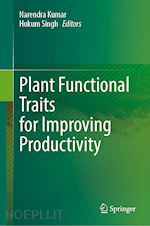
Questo prodotto usufruisce delle SPEDIZIONI GRATIS
selezionando l'opzione Corriere Veloce in fase di ordine.
Pagabile anche con Carta della cultura giovani e del merito, 18App Bonus Cultura e Carta del Docente
This book discusses how plant functional trait selection can help researchers to understand the plant-environment relationship, identify desirable traits, modulate plant resilience according to the changing climate, optimize resource use efficiency, and enhance genetic improvement. The plant functional traits-based approach provides a framework for improving crop productivity in agricultural systems with high precision. It enables researchers to develop crop varieties with desirable traits by focusing on the fundamental characteristics influencing growth, development, and response. Climate change and environmental variability pose significant agricultural challenges. The plant functional traits-based approach can help address these challenges by selecting and breeding traits that enhance resilience and adaptability capacity of the plant. This approach also contributes to sustainable agriculture, by focusing on increased food production, and resilience in extreme environmental conditions.
This book provides guidance to the researchers and breeders to develop crop varieties with desirable traits. It is also a reference book for graduate and postgraduate students studying botany and agriculture.
1- Plant functional traits: concepts and significance.- 2- Implication of plant functional traits in crop improvement: challenges and opportunities.- 3- The interplay between plant functional traits and climate change.- 4- Scientific advancement in trait measurement and quantification.- 5- Application of functional traits in modelling productivity and resilience under climate change.- 6- Role of plant functional traits in improving resource use efficiency.- 7- Traits influencing light capture and photosynthetic efficiency.- 8- Enhancing water use efficiency through trait-based approaches.- 9- Trait-based approaches to improve nutrient uptake efficiency in crops.- 10- Plant functional traits in crop breeding: advancement and challenges.- 11- Integrating marker-assisted and genomic selection for trait improvement.- 12- Genetic engineering and gene editing for targeted trait modifications.- 13- Plant functional traits assisted crop adaptation under abiotic and biotic stress.- 14- Managing crop adaptation to changing environmental conditions.- 15- Field application and validation of plant functional traits.- 16- Challenges and opportunities in scaling up plant functional traits-based approaches.- 17- Integration of plant functional traits in sustainable agriculture.- 18- Future challenges and opportunities.
Dr. Narendra Kumar earned his PhD in plant physiology from GB Pant University of Agriculture and Technology, Pantnagar, India. Later, he served as an assistant professor in various reputed academic institutes, especially Surajmal Aggarwal (Pvt.) Kanya Mahavidyalaya, Kichha US Nagar, Dev Bhoomi Group of Institute, Dehradun, India; Uttaranchal University, Dehradun, India; Doon (PG) College of Agriculture Science and Technology, Dehradun, India. He also worked as a research associate at Forest Research Institute, Dehradun, India. His research areas focus primarily on plant physiology, ecophysiology, plant response to abiotic stresses, climate change adaptation and mitigation, functional traits, and climate change modeling. He has published numerous articles in national and international peer-reviewed journals. He is currently employed as a project scientist at the Forest Genetics and Tree Improvement Division, Forest Research Institute in Dehradun, India.
Dr. Hukum Singh is a scientist at Forest Genetics and Tree Improvement Division, Forest Research Institute, Dehradun, India, and has been actively involved in research and teaching. He is a member of various national and international scientific societies/organizations. His research areas focus primarily on eco-physiology, plant response to abiotic stresses, green technology, climate change adaptation and mitigation, functional traits, carbon-water-energy flux, and climate change modelling. He has published many articles in national and international peer-reviewed reputed journals.











Il sito utilizza cookie ed altri strumenti di tracciamento che raccolgono informazioni dal dispositivo dell’utente. Oltre ai cookie tecnici ed analitici aggregati, strettamente necessari per il funzionamento di questo sito web, previo consenso dell’utente possono essere installati cookie di profilazione e marketing e cookie dei social media. Cliccando su “Accetto tutti i cookie” saranno attivate tutte le categorie di cookie. Per accettare solo deterninate categorie di cookie, cliccare invece su “Impostazioni cookie”. Chiudendo il banner o continuando a navigare saranno installati solo cookie tecnici. Per maggiori dettagli, consultare la Cookie Policy.